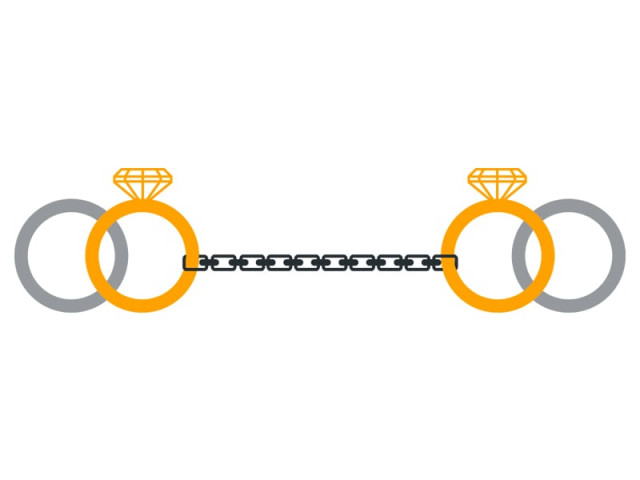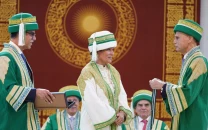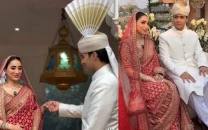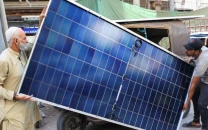The watta satta way: A bride for a bride?
An inside look at bride exchanges and what they mean for women’s welfare in Pakistan.

Unfortunately, Parveen is but one amongst countless other women who suffer a similar fate at the hands of their families — the male patriarchs in particular. watta satta is best defined as the exchange of brides between two families, be it for a pair of siblings, cousins or any other familial ties that can exist between a male and female. Herein, the daughter of one house is offered in return for a daughter of another, regardless of whether they agree to the marriage or not. In Pakistan, about 75% of these marriages are amongst blood relatives and 90% occur within the same village or community, often leading to problems associated with intermarriage and consanguinity.

Although marriage as an institution remains highly venerated in Pakistan, watta satta is coupled with an underlying, mutual threat of retaliation from the two families involved. It can be regarded somewhat as a mechanism for coordinating the agendas of both families, each wishing to restrain the son-in-law. “watta satta affords a certain security,” explains Parveen. “If one family mistreats their daughter-in-law, the other can retaliate by doing the same. The security lies in the idea that fear of revenge might discourage either side from causing any harm to the women.”
But while this false sense of security may be the main proponent of the practice, in reality, watta satta marriages seem to cause more trouble and discord within the family unit than a normal one. “I believe the problem arises because in watta satta, there are too many people who automatically get involved,” explains domestic-worker Anisa Shahid who was briefly engaged to her cousin in a similar set-up. “In a normal marriage, the two families that matter are the bride and groom’s. In watta satta, the entire khandaan becomes involved! My mamoo pressurised my mother to promise me to my khala’s son so that my younger brother could get married to her daughter. A lot of interlinked problems ensued which thankfully, lead to both engagements getting annulled.”
It can be argued that the nature of the custom seeks a balance between two marriages which many consider impossible. “Everyone is different and so are their relationships,” states Parveen. “No two marriages can be the same. During my marriage, there have been many times when I was happy but my mamoo was not. I was forced to leave my home every time he fought with his wife.” Parveen sheds more light on her tragic experiences by confessing that her relationship with her husband was mostly problematic. “You see, my mamoo could support his family financially but my husband could not. I had no choice but to become the sole breadwinner for my children while my mumaani relaxed at home. You could say I really got the bad end of the deal.”
According to social worker Mrs Siddiqui, who works with estranged and divorced women in rural Pakistan regularly, the domino effect of one bad marriage is the greatest disadvantage of watta satta. “Even if one of the couples is happy, the in-laws pressurise the husband to mistreat or leave his wife,” she explains. “The poor husband has no choice but to listen to his family and in this way, not just one but two marriages are disrupted for no reason whatsoever.”
Mrs Siddiqui also feels that entire concept of a bride exchange reinforces child marriages within society as many parents feel obligated to trade off their younger offspring should there not be other suitable options for older people. “When there is no appropriate match, a young girl may be married off to an old man or a boy to an older woman,” she says. Age bears little importance here so long as the elder person finds a spouse. Such was the case of 12-year-old Gulmeena who has recently been in the news on account of surviving a murder attempt for fleeing her abusive, 60-year-old husband.

As consequence, marital disharmony due to domestic abuse and estrangement is significantly higher in watta satta marriages as opposed to conventional ones. On the other hand, the wife’s mental and physical health is inversely proportional as many suffer chronic depression and frustration due to their fate. “During the time I was engaged to my cousin, his mother and my mother, who are sisters, began to fight a lot,” confesses Anisa. “He blamed me for it and called me a home-wrecker. I was not only stuck in an engagement I didn’t want but also caught amidst family drama, depressed and desperate for a way out.”
It must be noted that while watta satta is most common to the lower-income brackets of interior Paksitan, where education and women’s rights are minimal, a few instances of the practice can be found amongst the relatively privileged as well. Zainab Pasha, a young bride raised and educated in Islamabad was recently betrothed in watta of a relative from Mirpur Khas. Upon marriage, Zainab was forced to leave the comforts of her home and move to the village which has caused her a great deal of mental turmoil. “Finances really affect the efficiency of any marriage, be it watta satta or not,” she says. “My bhabi is leading my old, luxurious life in Islamabad while I am stuck here. I can’t help but lament over my lost life; I was much happier then.”
What is worst is that the prevalence of watta satta hints at the lack of freedom and respect women hold in Pakistan and how they are regarded as mere commodities to be exchanged for male gratification. In our patriarchal society, standing up for one’s rights can often be a death sentence and fear discourages many women to accept their predicaments without fighting. “It was extremely demeaning for me to not only have no say in who I am to spend my life with but also be a part of a trade-off just so my brother could find a wife,” admits Anisa. “I would wonder if I wasn’t good enough to command more respect? Was I not my parents’ child as much as my brother? But I was too scared to voice these concerns.”
Fortunately, society seems to be moving away from the practice due to the notorious reputation it has acquired. “Our younger generations are strictly against watta satta and unafraid to stand up for it,” says Parveen. “In Chiniot, the number of watta satta marriages is decreasing with every generation.” She attributes this change in attitude to awareness and the rise of the media, especially television serials depicting stories of victims that serve as learning opportunities for youngsters. And Anisa agrees. “There have been some serials and documentaries focused around various social issues and the problems they entail,” she says. “I think the media should be commended for bringing them on to the table and trying to devise a solution.”
Additionally, as more and more people migrate from the rural areas to urban metropolises, their ideologies are challenged and expanded, encouraging them to deviate from unpleasant practices like watta satta. This coupled with the increasing education can create awareness that could help safeguard the interest of women across the country. As Anisa puts it, “Awareness is key and the more aware we become, the less of a problem watta satta will be.”
Published in The Express Tribune, Ms T, July 6th, 2014.











1733130350-0/Untitled-design-(76)1733130350-0-208x130.webp)







COMMENTS
Comments are moderated and generally will be posted if they are on-topic and not abusive.
For more information, please see our Comments FAQ